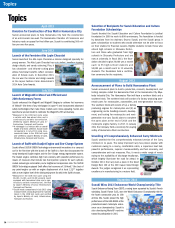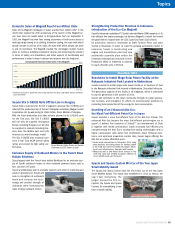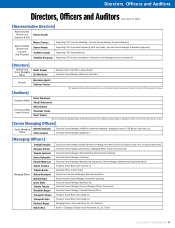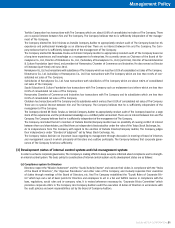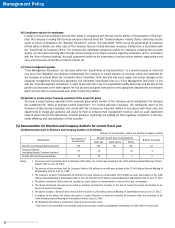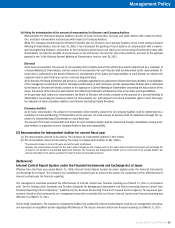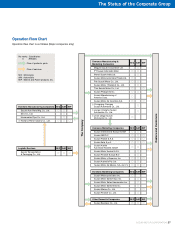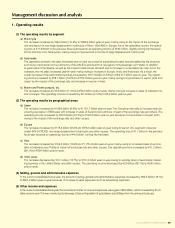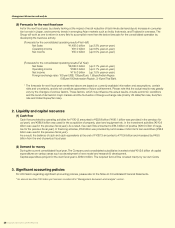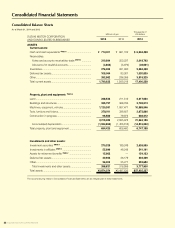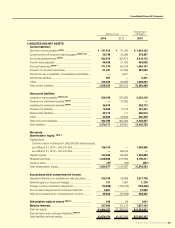Suzuki 2014 Annual Report Download - page 25
Download and view the complete annual report
Please find page 25 of the 2014 Suzuki annual report below. You can navigate through the pages in the report by either clicking on the pages listed below, or by using the keyword search tool below to find specific information within the annual report.
SUZUKI MOTOR CORPORATION 23
Management Policy
(b) Policy for determination of the amount of remuneration for Directors and Company Auditors
Remuneration for Directors/Company Auditors consists of basic remuneration, bonuses and stock options with respect to Direc-
tors, and basic remuneration and bonuses with respect to Company Auditors.
While The Company discontinued its retirement benets plan for Directors and Company Auditors at the 140th Ordinary General
Meeting of Shareholders, held on June 29, 2006, it has introduced the granting of stock options as compensation with a view to-
ward strengthening Directors’ connection to The Company’s performance and stock price and ensuring that Directors share with
shareholders not only the benets of any increases in the stock price, but also the risks of any declines, pursuant to the approval
granted at the 146th Ordinary General Meeting of Shareholders, held on June 28, 2012.
(Director)
As for basic remuneration, the amount of remuneration limit (monthly amount) for all Directors shall be determined by a resolution of
a General Meeting of Shareholders, and the amount of remuneration for each Director shall be determined by the representative Di-
rector who is authorized by the Board of Directors in consideration of the duties and responsibilities of each Director to enhance the
corporate value in each scal year and on a mid-and long-term basis.
As for bonuses, the Board of Directors will decide on a proposal regarding bonus payments to Directors/Company Auditors in consideration
of the management environment and The Company’s performance in each scal year, and the representative Director who is authorized
by the Board of Directors will decide, pursuant to the approval of a General Meeting of Shareholders concerning the total amount of the
bonus, the amount of the bonus for each Director that reects each Director’s achievement of his or her duties and responsibilities.
As for granting stock options as compensation, the Board of Directors will decide, pursuant to the approval of a General Meeting of
Shareholders concerning the maximum amount of remuneration, etc. with respect to the stock acquisition rights in each scal year,
the allocation of stock acquisition rights to each Director (excluding Outside Directors).
(Company Auditor)
As for basic remuneration, the amount of remuneration limit (monthly amount) for all Company Auditors shall be determined by a
resolution of a General Meeting of Shareholders. As for bonuses, the total amount of bonuses shall be determined through the ap-
proval of a General Meeting of Shareholders in each scal year.
The amount of the basic remuneration and bonus for each Company Auditor shall be determined through consultations among Com-
pany Auditors in proportion to each Company Auditor’s duty and responsibility.
(5) Remuneration for Independent Auditor for current scal year
(a) The remuneration amount to be paid by The Company to Independent Auditors is ¥84 million.
(b) The remuneration amount to be paid by The Group to Independent Auditors is ¥87 million.
*The amounts shown in (a) and (b) were all paid for audit certication.
Because the remuneration amount for the audit under Companies Act of Japan and for the audit under Financial Instrument and Exchange Act
of Japan is not divided in the Auditing Agreement between The Company and Independent Auditor and is not be able to be actually divided, the
amount described in the above species the total of these remuneration amounts.
(Reference)
Internal Control Report System under the Financial Instruments and Exchange Act of Japan
Eective from the scal year ended March 31, 2009, Internal Control Report System has been applied under the Financial Instruments
and Exchange Act of Japan. The Company has established a project team to enhance the system for assessment of the eectiveness of
internal controls over the nancial reporting.
Our management executive assessed the eectiveness of internal control over nancial reporting as of March 31, 2014 in accordance
with “On the Setting of the Standards and Practice Standards for Management Assessment and Audit concerning Internal Control Over
Financial Reporting (Council Opinions) ” published by the Business Accounting Council of Financial Services Agency, The Japanese gov-
ernment. Based on that assessment, our management executive concluded that our Group’s internal control over nancial reporting was
eective as of March 31, 2014.
Seimei Audit Corporation, The Company’s Independent Auditor, has audited the Internal Control Report made by our management executive,
and expressed an unqualied opinion regarding eectiveness of The Group’s internal control over nancial reporting as of March 31, 2014.



